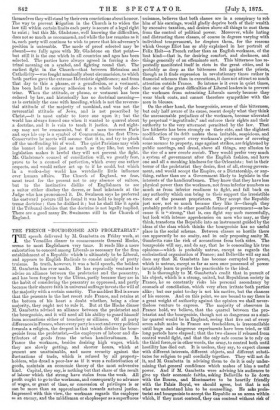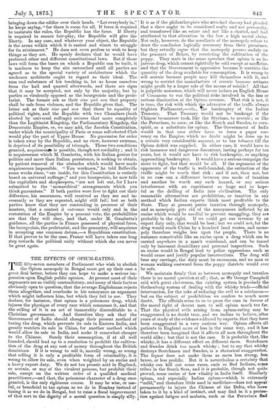THE FRENCH "BOURGEOISIE AND PROLETARIAT."
THE speech delivered by M. Gambetta on Friday week, at the Versailles dinner to commemorate General Hoche, seems to most Englishmen very tame. It reads like a mere exhortation to concord among Liberals as necessary for the firm establishment of a Republic whick is ultimately to be Liberal, and appears to English Radicals to consist mainly of pretty truisms. In truth, however, it was a bold speech, the boldest M. Gambetta has ever made. He has repeatedly ventured to advise an alliance between the proletariat and the peasantry, and has been forgiven by the Ultras, partly because they are in the habit of considering the peasantry as oppressed, and partly because their sincere faith in universal suffrage invests the will of the iiaajority with a certain sanctity. The maddest Red is aware that the peasants in the last resort rule France, and retains at the bottom of his heart a doubt whether, being a clear majority, they ought not to rule it. But at the Hoche dinner M. Gambetta advised an alliance between the proletariat and the bourgeoisie, and it will need all his ability to guard himself from accusations either of treachery or silliness. Of all party differences in France, where every party is a sect and every political formula a religion, the deepest is that which divides the bour- geoisie from the proletariat,—the employers of labour and dis- tributors of goods from the urban handicraftsmen. In France the workmen, besides desiring high wages, which they are slowly getting, and shorter hours, which at present are unattainable, and more security against the fluctuations of trade, which is refused by all property- holders, who dread a poor-law as if it were a redistribution of goods, maintain an economic theory of the most subversive kind. Capital, they say, is nothing but that share of the result of labour which thd strong have stolen from the weak. All profit ought to go to the workman, and consequently no advance of w es, or grant of time, or concession of privileges is or can be more than an approximation towards natural justice. Impressed with this view, the workman regards the employer as an enemy, and the middleman or shopkeeper as a superfluous nuisance believes that both classes are in a conspiracy to rob him of his earnings, would gladly deprive both of their wealth by excessive taxation, and desires above all things to oust them from the control of political power. Moreover, while hating and distrusting these classes, of course in degrees varying with individual temperament, he despises them, for the reasons which George Eliot has so ably explained in her portrait of Felix Holt—a French rather than an English workman, of the best kind—that is, for desiring comfort, and sleekness, and things generally of an effeminate sort. This bitterness has re- peatedly manifested itself in riots in the great cities, and is probably as deep as the bitterness felt against the priests, though as it finds expression in revolutionary times rather in financial schemes than in executions, it does not attract so much attention outside France. So intense is it even in quiet times, that one of the great difficulties of Liberal leaders is to prevent the workmen from ostracising Liberals merely because they wear black coats, and cannot therefore sympathise with the men in blouses.
On the other hand, the bourgeoisie, aware of this bitterness, but only half aware of its cause, resent deeply what they think the unreasonable prejudices of the workmen, become ulcerated by perpetual "ingratitude," and enforce their rights and their authority to the very uttermost permitted by the law. That law hitherto has been strongly on their side, and the slightest modification of its drift makes them irritable, suspicious, and timid. They suspect every workman's grievance of covering some menace to property, rage against strikes, are frightened by public meetings, and dread, above all things, any allusion to the rise of a new couch sociale. They would prefer very much a system of government after the English fashion, and have one and all a sneaking kindness for the Orleanists ; but in their terror of the proletariat they desire, first of all, strong govern- ment, and would accept the Empire, or a Dictatorship, or any- thing, rather than see a Government likely to legislate in the interests of the handicraftsmen. They know that they have less physical power than the workmen, not from inferior numbers so much as from inferior readiness to fight, and fall back on any authority which can bring to their support the irresistible force of the peasant proprietors. They accept the Republic just now, not so much because they like it—though they probably prefer it to other possible forms of government—as be- cause it is "strong," that is, can fight any mob Successfully, but look with intense apprehension on men who may, as they think, transform the Republic into an instrument guided by the ideas of the class which thinks the bourgeoisie has no useful place in the social scheme. Between classes so hostile there can apparently be no amity, and in only proposing amity M. Gambetta runs the risk of accusations from both sides. The bourgeoisie will say, and do say, that he is concealing his true opinions—which is probably untrue, except as regards the ecclesiastical organisation of France; and Belleville will say and does say that M. Gambetta has become corrupted by power, which is untrue, except so far as men once possessed of power invariably learn to prefer the practicable to the ideal.
It is thoroughly to M. Gambetta's credit that in pursuit of his object, which is a strong, united, but Republican society in France' he so constantly risks his personal ascendancy by counsels of conciliation, which very often irritate 'both parties alike ; but our point to-day is not his motive, but the chances of his success. And on this point, we are bound to say there is a great weight of authority against the opinion we shall never- theless venture to express. The majority of observers in France hold, we believe, that the quarrel between the pro- letariat and the bourgeoisie, though not so dangerous as a simi- lar quarrel would be in England, seeing that five out of every seven adult males in France are freeholders, is irreconcilable until huge and dangerous experiments have been tried, or till long periods have elapsed ; that the two classes if released from control would fight, and that the only safe course is to rely on the third force, or in other words, the army, to control both until hostility has died out. It is useless, they say, to expect classes with different interests, different objects, and different substi- tutes for religion to pull cordially together. They will not do it, and M. Gambetta in advising them to do it is only under- mining that general confidence which makes of him a useful power. And if M. Gambetta were advising his audiences to give up their economic faiths, asking Belleville to lie down with the Bourse, and Montmartre to be heartily friendly with the Palais Royal, we should agree, but that is not what we understand him to be counselling. He asks prole- tariat and bourgeoisie to accept the Republic as an arena within - which, if they must contend, they can contend without risk of bringing down the edifice over their heads. "Let everybody in," he keeps saying, "for there is room for all. If force is required to maintain the rules, the Republic has the force. If liberty is required to ensure fair-play, the Republic will give the liberty. In any case, and whatever your object, the Republic is the arena within which it is easiest and wisest to struggle for its attainment." He does not even profess to wish to keep things as they are. He openly declares that he would have preferred other and different constitutional laws. But if those laws will form the bases on which a Republic can be built, it is madness to keep the site untouched until all parties are agreed as to the special variety of architecture which the unchosen architects ought to regard as their ideal. The sum and substance of his teaching is, let us house ourselves from the hail and quarrel afterwards, and there are signs that it may be accepted, not only by the majority, but by parties so virulently opposed as the bourgeoisie and the prole- tariat. The former ask as their sine qua' non that property shall be safe from violence, and the Republic gives that. The latter ask as their sine qta non that there be equality of political rights, and the Republic with two Chambers (both elected by universal suffrage) secures that more completely than the Legitimist Kingship, the Parliamentary Kingship, the Democratic Empire, or, we may add, the Jacobin Constitution, under which the municipality of Paris or some self-elected Club would play the part of Upper House. No guarantee for order is taken away by the Republic, and no view, however extreme, is deprived of its possibility of triumph. Those two conditions granted, acquiescenat is possible, though not cordiality ; and it is acquiescence which M. Gambetta, with his Italian genius for politics and more than Italian persistence, is seeking to obtain, by patient removal of the obstacles which would have made acquiescence impossible. "You workmen," he told Belleville some weeks since, "are inside, for this Constitution is entirely based on universal suffrage ;" and you bourgeoisie, he now tells the capitalists and shopkeepers, "are not left out, for I have submitted to the 'monarchical' arrangements which you think guarantees." If both parties were free to fight out their difference, his assurances, well received as they are and in- cessantly as they are repeated, might still fail; but as both parties know that they are contending in presence of their masters, that a contest a outrance would only end in the restoration of the Empire by a peasant vote, the probabilities are that they will obey, and that, under M. Gambetta's guidance, all the parties in France possessed of physical force, the bourgeoisie, the proletariat, and the peasantry, will acquiesce in accepting one common datum,—a Republican constitution. If that proves to be the case, France will have taken one long step towards the political unity without which she can never be great again.



































 Previous page
Previous page